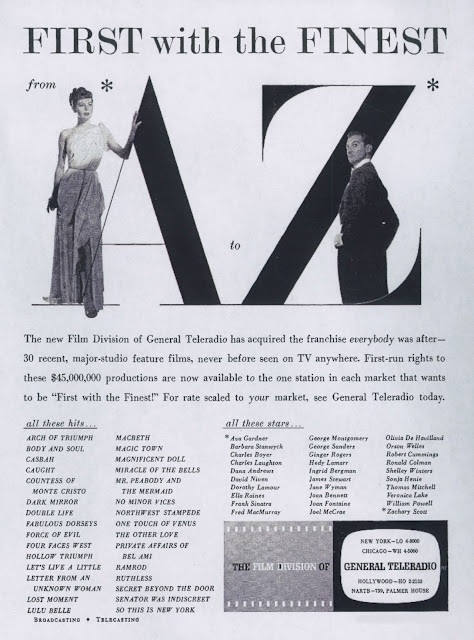Sandor's Been Underestimated!
Quick: How many recognize Irving Pichel as anything other than "Sandor" in Dracula's Daughter? That's how I knew him for a lot of years before learning that Pichel also directed, taught, spoke with dulcet tones as narrator, and wrote frequent while serving among editors of The Hollywood Quarterly, a precursor to Films In Review and serious journals reflecting on film. Pichel died in 1954 at age 63, concluding his career on the Theatre Arts faculty at UCLA, but still an active director of features, stage, and television to the very end. I printed out and read a stack of articles he wrote for the Quarterly, and they're excellent. How many among working directors maintained ongoing analysis of the industry they served? These read like a private journal making its way regularly to print. Pichel defended Rope experiment against criticism of Hitchcock's long-take technique, waxed eloquent on how George Stevens at last got An American Tragedy adapted right with A Place In The Sun, and took Hollywood to task for absurdity of its "Movies Are Better Than Ever" incantation (how could they be, asked Pichel, when a postwar public was spending disposable dollars on so many other things?).
Pichel the director was held in high esteem. The Hollywood Quarterly's eulogy saw contribution from big names: Dudley Nichols, Josef Von Sternberg ("Irving Pichel was one of the finest human beings I ever met" --- to how many would truculent Jo pay such homage?), plus opportunity taken by Paul Muni to salute Pichel's memory and lob a grenade at
Irving Pichel liked faith-based subjects. His Martin Luther (1953) played theatres and every protestant church for states around; I remember it showing up in seemingly every 16mm rent catalogue published. Pichel's final film was a life of Christ, Day Of Triumph, released posthumously. I checked its availability at Amazon, where one used VHS is offered --- for $500. What might we be missing here? The Miracle Of The Bells was independent-produced by Jesse L. Lasky; you'd have thought he was making movies since Grant/Lee rode, although Bells would be his last. Lasky had a venerable name and Sergeant York among recent accomplishments, so the Bank Of America loaned him $1,472,696 on 6/30/47 to make The Miracle Of The Bells. RKO released the film in 5/48 (total cost: $2.2 million) and it lost $640,000. The bank had a chattel mortgage on Bells and so seized the negative when its loan went unpaid. The Miracle Of The Bells was sold by BOA to General Teleradio for TV packaging (the price? $85,000) with other seized pics in 1954. Here then, was where the '48 flop performed it truest miracle by becoming the highest rated program to have played
"The best prize package of feature films ever to be offered TV", according to Variety, was made available by General Teleradio to Los Angeles stations in April, 1954. There were thirty-two titles, all having been seized by Bank Of America for loans unpaid, and dealt to Teleradio. The latter had hoped to make a network deal first, for more dollars than could be got from syndication, but negotiations went south. It was a sweet list of mostly A pics with stellar names: Body and Soul, Arch Of Triumph, A Double Life, The Dark Mirror, Force Of Evil, and more. KHJ, Channel 9, took the plunge in June, hoping the package would bring them even with six rival stations in the
 |
| Note Fred's Identical Disapproving Expressions in This and the Still Above with Harold Vermilyea |
Bells indeed rang for the broadcaster as Miracle(s) were performed to tune of 2,954,500 people watching over five nights the film was shown, an audience "without precedent in L.A.," said Variety. KHJ pledged to hold commercial interruptions down to five minutes, unlike New York's WOR-TV, which gave a minute to each of eight sponsors, plus a minute preview for the following week's movie, all this jammed into ninety-minute time slots obliging station editors to bear down with shears (The Miracle Of The Bells, a two-hour movie originally, was not so on WOR). All this took place two years ahead of major studios selling or leasing their pre-48 libraries to syndication, time enough for the General Teleradio package to get wide exposure and win many admirers for The Miracle Of The Bells and others in the group. Bells would, in fact, become a holiday perennial in many markets and be fondly remembered by viewers who caught it at least yearly. Bells and others of BOA seizure, and ultimate









2 Comments:
I had seen "Daughter of Dracula" for the first time only recently, and Irving Pichel looked familiar, but I couldn't place the face. It wasn't until I scanned his resume on imdb and discovered he played a really creepy hoodlum in "The Story of Temple Drake" that my memory kicked in. By that role alone, it's astonishing Paul Muni was talking about the same guy.
I read Russell Janney's The Miracle of the Bells when I was 13 and thought it was a great novel; I reread it 40 years later and decided it's a 13-year-old's idea of a great novel. Still, I think the story has terrific potential: A slick and cynical PR man, through the crassest of motives, pulls a publicity stunt that ends up changing everyone's life, including his own, and making them all better people for the experience. That's the miracle, not the part about two statues turning on their pedestals.
The movie, I thought, only fitfully fulfills this potential (although I was disappointed in it, I've never thought it was the turkey Leonard Maltin and others said it was). Interestingly enough, while I was reading the book in 1961, I pictured Robert Young in the Fred MacMurray role.
Notwithstanding Miracle and Dracula's Daughter, for me Irving Pichel will always be the director of Destination Moon.
Post a Comment
<< Home